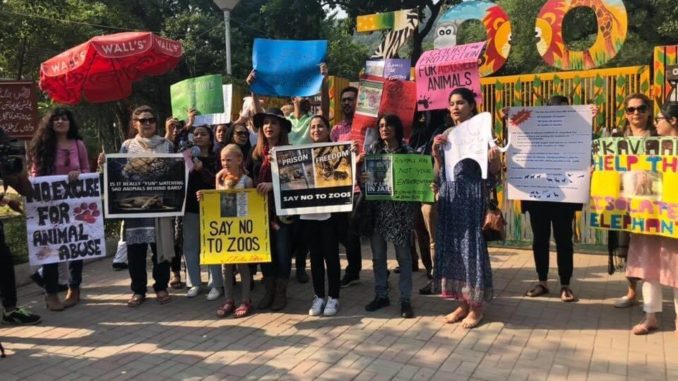
In Ukraine, public auctions have a wild side — offering lions and bears — in the country’s first case of confiscating wild animals. The animals are being “auctioned” for free because there is no way to pay for their accommodation.
The bigger issue is the back story: The brutal treatment of zoo animals.
The issue began in 2018. Activists raised flags about the dire conditions of animals at a private zoo in Pokrovsk, Donetsk region, horrified to see brown bears huddled in cramped cages for months. Emaciated lions living in their urine and faeces. One of the lions was 154 pounds. The normal weight of a healthy male lion should be around 500 pounds.
The lions risked dying from hypothermia. The bears could catch frostbite, caused by their limbs in contact with the metal floor. Nobody cleaned the cages and food was scarce.
“For several months, they gave the lions only bones. By the time a private animal rehabilitation center rescued them, someone started giving them grains. The lions, who don’t eat anything but meat, filled their stomachs with forage and bones. At outside temperatures dropping below 14 degrees, the lion froze to its own feces. When it got up, there was a crackling sound – a piece of its skin tore off,” said Alexandr Pylyshenko, an owner of the center in the Vasilyevka, Zaporizhzhya region.
The Vasilyevka zoo received 11 animals in total: five lions, five brown bears and one Himalayan bear.
A few days after relocating, one lion died from its previous living conditions. Lova the lion went to a sanctuary in South Africa. A Carpathian brown bear, Laska, later went to the Domazhir bear refuge in the Lviv region. The bear required special rehabilitation as it was previously at a hunting dogs’ training enclosure.
Pylyshenko stepped in to help.
He agreed to place the animals in his zoo for 40 days, pending a court decision on the fate of the animals. But the bureaucratic process dragged on for a year and a half. Keeping animals — nutrition, veterinary care, the maintenance of enclosures, the salary of employees — is expensive. The animals’ main nutritional demands peak between August and October.
The stats are staggering: One bear consumes 35,000 calories per day, equal to what two standard soccer teams would need to eat. Since authorities have not allocated any money for the animals’ maintenance volunteers must cover the costs.
The include South African Lionel De Lange and his Ukrainian partner Anna Masyach; both contributed to a more positive outcome for the animals.
The couple runs Warriors of Wildlife, which evacuated animals from Ukraine to South Africa and Romania. The three lions will fly to South Africa as soon as they get CITES permits (the Convention on International Trade in Endangered Species of Wild Fauna and Flora) and the travel restrictions are lifted.
While documents are readied, the organization has been raising funds for its mission.
“It is a difficult and very expensive process. The air transport for the lions will cost about $11,500, but that excludes special travel crates, vets, transport within Ukraine to Boryspil Airport, Transport from O.R. Tambo airport to the sanctuary in Freestate, SA. All the food and medical costs, while waiting for them to travel,” De Lange said.
The lions will be sent to thhe Love Lions Alive Sanctuary, which already cares for 21 lions. “It also hosts four Ukrainian lions, including Lova who came from Pokrovsk. They will have professional care, the best vets, in a safe secluded area with security,” De Lange said.
Next year, Ukraine plans to ban the use of animals in circuses. While such laws are just being prepped, trainers and circus performers are already handing over their animals to private zoos.
As of January 2020, there were an estimated 317 animals in the circuses of Ukraine, 96 of which were owned by the state itself. The rest were rented. However, Ukrainian zoos are not prepared to take the animals, lacking appropriate facilities and resources.
Ukraine also doesn’t regulate the wild animal market.
Lawmakers in parliament have proposed compulsory make registration and identification of wild animals, stipulating the banning of private ownership. Until that passes, the standards and procedures for rehabilitation of these wild animals remain in a precarious state.
“You can buy and sell everything in Ukraine, as long as you have a document for the legal ownership of the animals,” said Maria Trunova from the Ukrainian Association of Animal Defenders. “But no one regulates the online market, the living conditions and breeders’ records.”
(Edited by Fern Siegel and Matt Rasnic)
The post Appalling Zoo Conditions in Ukraine Lead to Wild Animal Auctions appeared first on Zenger News.
